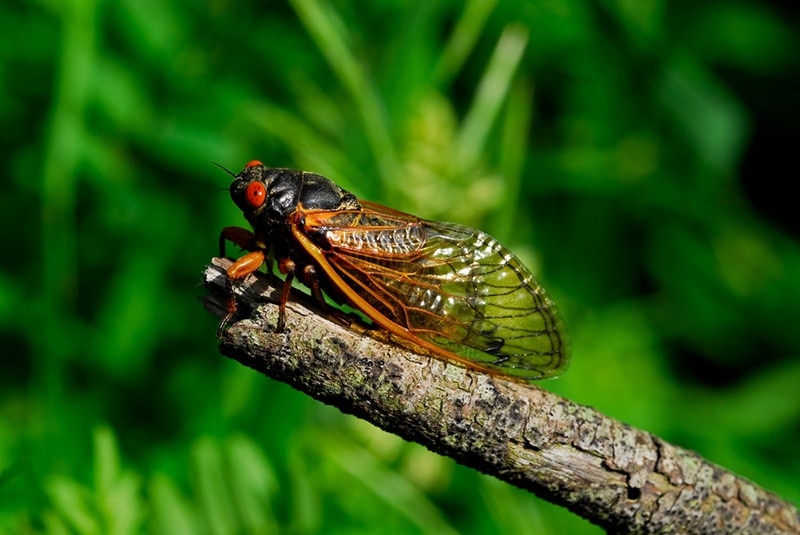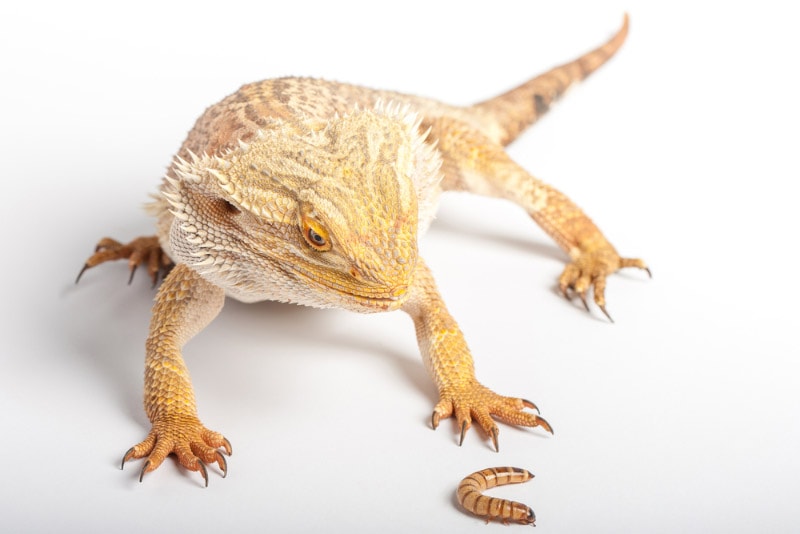Can Bearded Dragons Eat Butternut Squash? Vet-Approved Facts & FAQ
Updated on
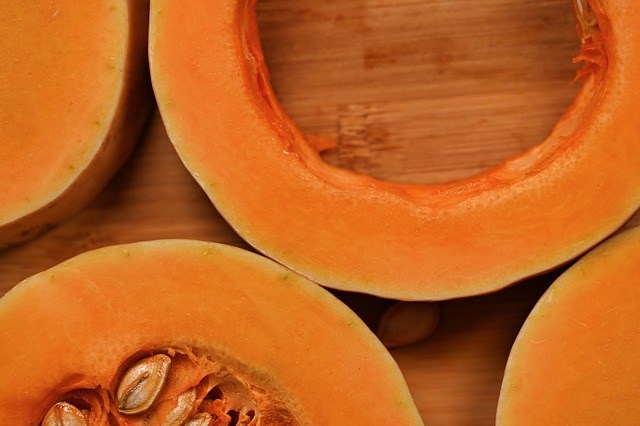
Click to Skip Ahead
As the pet parent of a bearded dragon, you do everything you can to keep them healthy and happy. That includes feeding them the right diet. One food you might have wondered about is delicious and nutritious (at least for humans). Can beardies eat butternut squash? Indeed, they can, both cooked and raw!
Knowing your bearded dragon can eat butternut squash opens up more interesting questions. For example, how much butternut squash can a beardie eat, and how should it be prepared? Are there any drawbacks to feeding butternut squash to a bearded dragon, or can they eat it every day?
For the answers to these and several other questions, read on! We have them for you below, plus tips and advice on how to keep your bearded dragon happy and healthy!
What Benefits Does Eating Butternut Squash Offer Your Bearded Dragon?
Butternut squash, like most squash varieties, contains some vital nutrients. Let’s take a quick look at the most important nutrients and how they can help your Beardie.
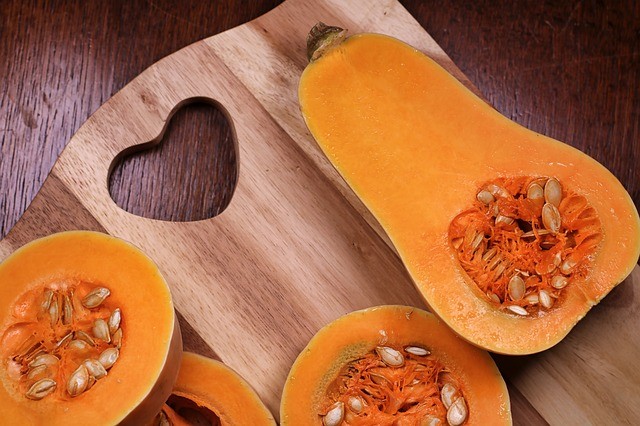
Vitamin C
Like almost all animals, your bearded dragon needs Vitamin C to stay healthy. As an antioxidant, this vitamin helps your pet’s immune system.
Vitamin A
One interesting thing about bearded dragons is that they’re sensitive to Vitamin A while still needing it to stay healthy. Butternut squash contains beta-carotene which is converted to vitamin A by the body in the amounts a bearded dragon needs.
Calcium
Calcium is essential for your bearded dragon’s bones, teeth, joints, and muscles, the calcium level in butternut squash is higher than most other squash varieties.
The Calcium : Phosphorus Ratio Is Healthy in Butternut Squash
Bearded dragons need calcium and phosphorus in their diet, but if the ratio of the two is off, it can contribute to health issues, in particular Metabolic Bone Disease. In butternut squash, the calcium:phosphorus ratio is about 1.5:1 and nearly optimal. The ideal ratio for adult beardies is around 2:1.
Butternut Squash Is Low in Sugar
Another thing that can cause problems for your beardie is sugar. The good news is that even though it is technically a fruit rather than a vegetable, butternut squash is low in sugar.
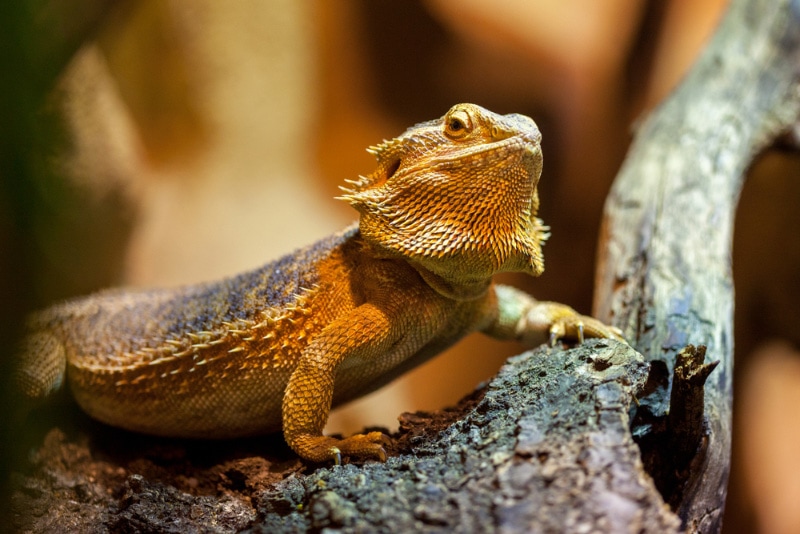
Does Butternut Squash Pose any Health Risks for Your Bearded Dragon?
The good news is that butternut squash poses very few risks if fed to your bearded dragon in moderation as part of a balanced diet.
Bearded dragons are omnivores and require a varied diet. A mixture of calcium rich leafy greens should be offered daily and should make up most of the plant based part of their diet. If too much butternut squash is fed they may not get all the other essential nutrients they need in their diet. If you have any health concerns about your bearded dragon then contact your vet for advice.
How Should Butternut Squash be Prepared for Your Bearded Dragon?
Preparing butternut squash so that it’s safe for your bearded dragon to eat isn’t difficult but requires a bit of preparation time. Follow the steps below to prepare butternut squash for your pet like a pro.
- Wash the butternut squash thoroughly with water.
- Peel the raw butternut squash and toss away the peels (or put them in your compost pile).
- Chop the butternut squash into small pieces that are no bigger than the space between your bearded dragon’s eyes. Alternatively, you can also grate the butternut squash with a cheese grater.
- Feed the butternut squash to your happy bearded dragon
- Clean up any leftover butternut squash after your bearded dragon has finished eating or after about 30 minutes so that it doesn’t rot or attract insects.
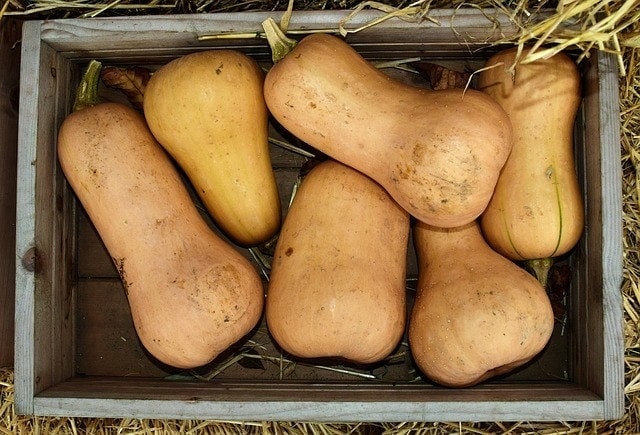
Can You Feed Raw Butternut Squash to Your Beardie?
The problem with cooking fruits and vegetables before feeding them to your pet is that cooking reduces many of the nutrients found in them.
What’s important to note with butternut squash is that it doesn’t pose any risk to your bearded dragon if cooked, as long as it’s plain with no added ingredients like oil or salt . Anecdotal evidence suggests that some bearded dragons prefer butternut squash when it’s been cooked, but veterinarians still recommend you serve it to them raw.
How Much Butternut Squash Can Your Bearded Dragon Eat?
Bearded dragons are omnivores and need both plant and animal material to meet their nutritional needs. The exact diet will depend on their age, with young Beardies needing less vegetables and a higher percentage of insects in their diet than adults. It is important to provide a variety of vegetables, to give the right balance of nutrients they need to keep them healthy and their bones strong. Although butternut squash is a botanical fruit, due to its low sugar levels, it is usually treated as a vegetable.
A mixture of leafy greens should be offered regularly with other vegetables and butternut squash being fed in lesser amounts approximately four times a week. This will depend on various factors including your dragon’s age so it’s best to seek advice from your vet to get the right balance for your pet. Depending on the size of your bearded dragon, you should be able to feed them four or five tiny chunks of the vegetable at a time.
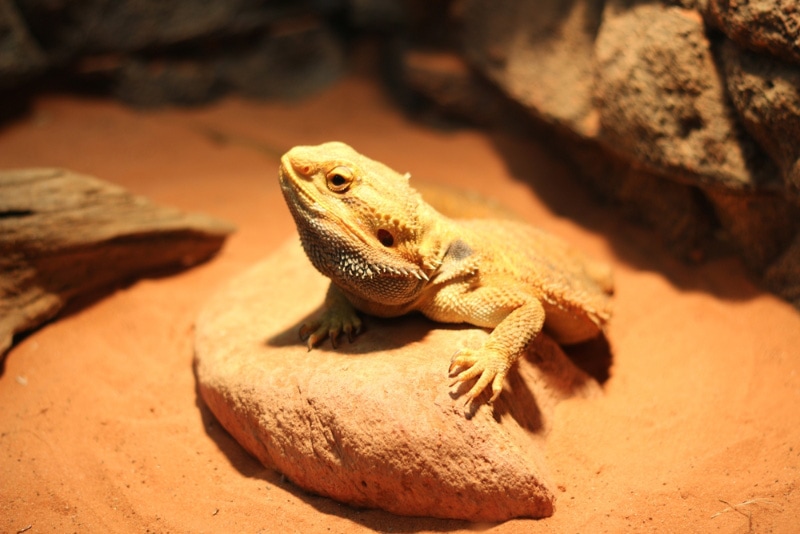
Which Vegetables Can Be Mixed with Butternut Squash to Feed a Bearded Dragon?
There are a surprising number of vegetables that you can safely feed to your bearded dragon, and all of them provide vitamins and other nutrients beneficial for your pet. We have two lists of vegetables below, one with the vegetables that should make up a higher percentage of their diet and the other with vegetables you should feed them less frequently.
Leafy greens should make up a large amount of the plant based portion of the diet as you’ll see from the lists below. This is not a complete list but gives plenty of ideas!
Vegetables that can be fed often
- Collard, beet, and mustard greens.
- Broccoli
- Kale
- Watercress
- Green cabbage
- Green beans
- Parsley
- Turnip greens
- Dandelions
- Swiss chard
- Bok choy
Other Vegetables (to be offered in lesser amounts)
- Asparagus
- Cucumber
- Carrots
- Cactus
- Okra
- Peas
Final Thoughts
Butternut squash is an excellent choice to feed your bearded dragon. It’s low in sugar, and contains vitamins C and A, along with a decent amount of calcium
Butternut squash has very little risk of causing health issues for your pet. It’s also easy to prepare and, like most vegetables, should ideally be fed to your bearded dragon raw. Leafy greens should make up the largest percentage of your bearded dragons diet with most experts advising that butternut squash can be offered about four times a week. Remember variety and a mixture of different vegetables is key to giving your beardie a balanced and healthy diet.
We hope the information provided today has given you some insight into safely feeding butternut squash to your bearded dragon buddy. If you have any questions about your pet’s diet then contact your vet for further advice. Best of luck feeding your dragon and keeping them healthy and happy for a long time!
Featured Image Credit: webdesignnewcastle, Pixabay


